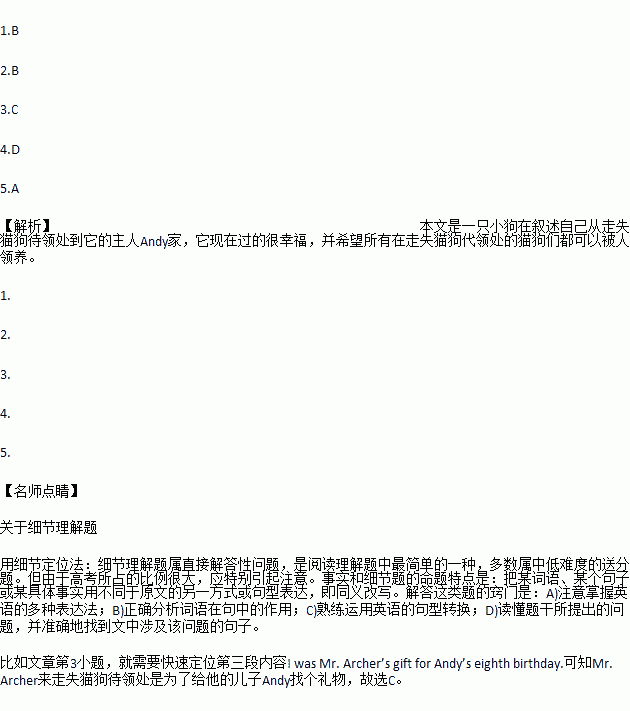题目内容
My name is Jake. I’m brown, and rather short, standing just a little past my master’s knees. My friend Andy once took me to a dog show. I’ve never seen so many different-looking dogs in my life! They all looked pretty and handsome, and their masters were very proud of them when they jumped and ran across so many barriers at that dog show. Andy promised that he’d let me join a dog show, too, if the organizers opened a division for my “breed”.
While I was watching that show, I remembered my friends at the pound(走失猫狗的待领处), where I spent two long weeks. We were kept in cages, and although we were well-fed, every day during those two weeks, I hoped to have someone touch my head and play with me.
You could just imagine how glad I was when, one day, Andy came in with his dad and pointed in my direction. I stood up on my hind legs and did a little jig (一种快步舞), and then I wagged my tail and tried to chase it. The father and his son kept laughing at what I was trying to do, and in a few minutes, I was riding on their car on the way to my new home. I was Mr. Archer’s gift for Andy’s eighth birthday. I heard him shout that I was the best gift ever!
My favorite amusement is hanging my tongue out of the car window and letting the wind blow on my face. I just love long drives! It is during these times that I think of all my friends whom I left behind at the dog pound. I hope that soon, little boys or girls would also pick them and give them new homes, so they would be able to enjoy walks in the park and trips to the beach, as I do now.
1.Why didn’t Jake join the dog show?
A. Because he wasn’t handsome enough.
B. Because his “breed” was not included.
C. Because Andy didn’t allow him to join in.
D. Because he couldn’t jump and run across barriers.
2.What can we learn about Jake when he was at the pound?
A. He couldn’t get enough food. B. He couldn’t enjoy full freedom.
C. He had to stand all the time. D. He was satisfied with his life.
3.Why did Mr. Archer come to the pound that day?
A. To donate some food. B. To volunteer at the pound
C. To find his son a gift. D. To spend his holiday
4.According to the last paragraph, what wish does Jake have?
A. Having more long drives with Andy.
B. Meeting his friends at the pound again.
C. More boys and girls coming to play with him.
D. His friends at the pound being adopted.
5.What did Jake feel after it got a new home?
A. happy B. terrible C. dissatisfactory D. blue
 新题型全程检测期末冲刺100分系列答案
新题型全程检测期末冲刺100分系列答案

 ced all the ignorance in me with ________. Then she opened my ________ and opened it even wider. She would find time to turn me into a ________ signer. She taught me that there are no limits and my abilities are ________.
ced all the ignorance in me with ________. Then she opened my ________ and opened it even wider. She would find time to turn me into a ________ signer. She taught me that there are no limits and my abilities are ________.